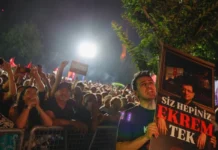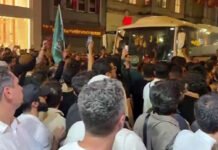Several MPs who attempted to mark UNESCO’s International Mother Language Day on Wednesday by giving speeches in minority languages in Turkey’s parliament were censored by the deputy speaker, who turned their microphones off.
The controversy began when Kurdish deputy Beritan Güneş Altın from the Peoples’ Democracy and Equality Party (DEM) started speaking in Kurdish and had her mic turned off by Deputy Speaker Celal Adan.
A member of the far-right Nationalist Movement Party (MHP), an ally of the ruling Justice and Development Party (AKP), Adan made a reference to Article 3 of the constitution, which defines Turkish as the country’s official language.
“Then you should tell your AKP mayoral candidates to stop holding election rallies in Kurdish in provinces like Mardin, Diyarbakır and Şanlıurfa,” Altın said, accusing the ruling party of hypocrisy.
The deputy speaker also turned the microphone off when another Kurdish MP, Burcugül Çubuk, read a text in Uzbek, a Turkic language like Turkish.
Tahsin Ocaklı, an MP from the main opposition Republican People’s Party (CHP), was also censored when he wanted to speak in Laz, a minority language from northeast Turkey, saying, “My mother will be watching. She expects me to say a few things in the Laz language.”
Another CHP deputy, Türkan Elçi, had her mic turned off when she wanted to speak in Kurdish.
“It is impossible to comprehend this intolerance,” DEM deputy Sezai Temelli said. “This commemoration doesn’t go against the constitution. We know the official language is Turkish. That doesn’t mean we can’t use our mother tongue. Please respect that.”
A nation-state based on the predominance of the Turkish identity, the Turkish state does not grant recognition to Kurds, the country’s largest minority group, while providing limited recognition to Greeks, Armenians and Jews on account of treaty obligations dating back to early 20th century.
Although the ruling AKP undertook certain reforms in the early 2000s to ease restrictions on the Kurdish identity, its alliance with the far-right MHP since 2016 has brought a return to discriminatory practices.
Courts usually do not allow individuals to make statements in Kurdish, and prisons charge inmates translation fees for the review of Kurdish-language publications or letters that they exchange with the outside world.
Kurds continue to suffer hate speech and hate crimes for speaking their language in public, such as a language teacher who last year received numerous threats over a video in which she was seen teaching children the Kurdish names of southeastern provinces.
The Kurdish language is also usually excluded from public services such as multilingual health or safety-related pamphlets or hotlines that often include languages of much smaller immigrant or expatriate communities such as Arabic and Russian.
Reports from earlier this week indicated that a man who complained on social media about the unavailability of Kurdish-language services at an İstanbul airport was briefly detained.















